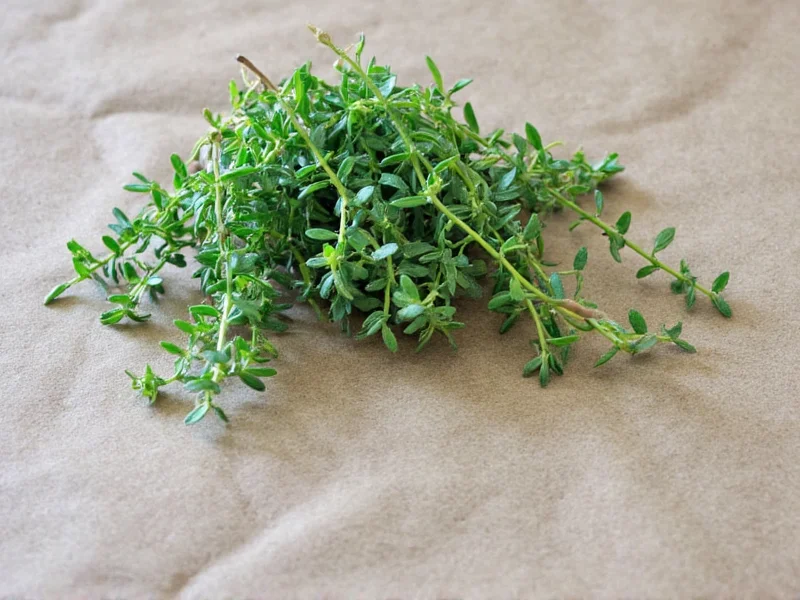Understanding how to properly pronounce thyme pronunciation is essential for anyone who loves cooking or wants to communicate accurately about culinary ingredients. Despite its spelling, thyme rhymes perfectly with \"time\"—a fact that surprises many English speakers. This silent \"h\" follows a pattern seen in other English words like \"rhythm\" and \"myth.\"
Breaking Down Thyme Pronunciation
The word \"thyme\" contains just one syllable and follows a straightforward phonetic pattern. In the International Phonetic Alphabet (IPA), it's represented as /taɪm/. Let's examine each component:
- t - pronounced as a standard \"t\" sound
- y - creates the long \"i\" sound (like in \"sky\" or \"cry\")
- m - ends with a clear \"m\" sound
When saying how to pronounce thyme correctly, emphasize the long \"i\" sound at the beginning, followed immediately by the \"m\". There's no pause or additional sound between these elements.
Why Thyme Is Pronounced Like Time
The reason for this thyme vs time pronunciation similarity lies in the word's etymology. Thyme comes from the Greek word \"thymon,\" which evolved through Latin and Old French before entering English. During this linguistic journey, the \"h\" became silent while the core vowel sound remained consistent with other words containing the \"y\" pattern.
This linguistic phenomenon explains why many people mistakenly pronounce it as \"thime\" (with a \"th\" sound like in \"think\"), creating a common mispronunciation of thyme. However, no standard English dialect pronounces the \"th\" in thyme as anything other than silent.
Thyme in Culinary Context
When discussing this herb in cooking contexts, proper thyme herb pronunciation demonstrates culinary knowledge. Consider these examples:
- \"Add fresh thyme (/taɪm/) to the stew during the last 15 minutes of cooking.\"
- \"The recipe calls for two sprigs of thyme (/taɪm/) and a bay leaf.\"
- \"I prefer the flavor of lemon thyme (/taɪm/) in my roasted vegetables.\"
Using the correct correct way to say thyme helps avoid confusion in professional kitchens and cooking classes, where precise communication matters.
Other Herbs with Unexpected Pronunciations
Thyme isn't alone in having a pronunciation that differs from its spelling. Many culinary herbs follow similar patterns. Here's a reference guide for culinary herb pronunciation guide:
| Herb Name | Phonetic Spelling | Common Mispronunciation |
|---|---|---|
| Thyme | /taɪm/ (like \"time\") | \"thime\" (with \"th\" sound) |
| Oregano | /ˌɔːrɪˈɡɑːnoʊ/ (or-ih-GAH-no) | \"oh-ree-GAH-no\" |
| Rosemary | /ˈroʊzˌmɛri/ (ROHZ-muh-ree) | \"ROHZ-mair-ee\" |
| Sage | /seɪdʒ/ (saj) | \"sahj\" (like \"sarge\") |
| Basil | /ˈbeɪzəl/ (BAY-zuhl) | \"BAS-uhl\" |
Mastering Thyme Pronunciation in Conversation
To ensure you're using the proper thyme pronunciation guide in everyday speech, try these practice techniques:
- Repeat the phrase \"time for thyme\" several times to reinforce the identical pronunciation
- Record yourself saying \"thyme\" and compare it to dictionary audio references
- Practice using thyme in sentences about cooking: \"I'll add some thyme to the sauce.\"
- Listen to professional chefs and culinary experts say the word in cooking shows
Remember that even experienced cooks sometimes stumble over why is thyme pronounced like time, so don't feel discouraged if it takes practice. The key is recognizing that the \"h\" serves only an etymological purpose and doesn't affect pronunciation.
Regional Variations in Thyme Pronunciation
While the standard pronunciation of thyme remains consistent across English-speaking regions, some accents may slightly alter the vowel sound. In British English, the long \"i\" might sound slightly more drawn out, while American English typically features a crisper vowel. However, no legitimate regional variation includes pronouncing the \"h\".
When discussing silent h in thyme with international colleagues, this consistency makes thyme one of the more straightforward herb names to communicate across dialects—once you've mastered the basic pronunciation pattern.











 浙公网安备
33010002000092号
浙公网安备
33010002000092号 浙B2-20120091-4
浙B2-20120091-4